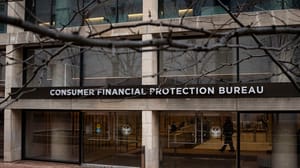SEC Approves 11 Bitcoin ETFsSEC Approves 11 Bitcoin ETFs
The decision comes a day after the commission’s X handle was hacked, with someone falsely posting the SEC had approved the funds.

The Securities and Exchange Commission has approved Bitcoin ETFs for the first time in a significant shift for the industry’s relationship to cryptocurrency.
The commission approved 11 proposals for spot Bitcoin ETFs “on an accelerated basis,” according to a SEC notice filed on the commission website this afternoon.
The SEC faced a Wednesday deadline on whether to approve a fund run by Cathie Wood’s ARK Investment Management and crypto asset manager 21Shares, but most believed they’d approve all 11 applications at the same time to dispel favoritism concerns, according to reporting from The Wall Street Journal.
The approval comes one day after the SEC’s X account was hacked and falsely claimed that the commission approved the 11 spot Bitcoin funds (which include the Grayscale Bitcoin Trust and the Invesco Galaxy Bitcoin ETF, among others). The false tweet fueled a brief hike in the price of crypto, and the SEC was working with investigators about the breach, according to Bloomberg.
The SEC found that the 11 proposals were consistent with the Exchange Act. Previously in determining whether Grayscale’s ETF passed muster, the commission found it hadn’t established that the Chicago Mercantile Exchange Bitcoin Futures Market “was a market of significant size” related to spot bitcoin.
But a decision from the D.C. Circuit Court of Appeals overturned the SEC’s decision, arguing the commission failed to “adequately explain its reasoning,” and returned it to the SEC.
“Based on these circumstances and those discussed more fully in the approval order, I feel the most sustainable path forward is to approve the listing and trading of these spot bitcoin ETP shares,” SEC Chair Gary Gensler said in a statement about the approvals.
In the decision, the SEC settled that outstanding question by arguing that “sufficient ‘other means’ of preventing fraud and manipulation in this context have been demonstrated” to allow approving the Grayscale ETF, along with the other 10 applicants.
The filing also clarifies that broker/dealers must follow Regulation Best Interest when recommending exchange-traded-products to retail customers (including these funds). Additionally, investment advisors must adhere to the fiduciary standard of the 1940 Advisers Act when suggesting these products, according to the commission.
In his statement, Gensler stressed the approval of these spot Bitcoin ETFs was not an endorsement of Bitcoin, et al, arguing the action was “cabined” to ETFs holding that particular non-security.
“It should in no way signal the Commission’s willingness to approve listing standards for crypto asset securities,” Gensler said. “Nor does the approval signal anything about the Commission’s views as to the status of other crypto assets under the federal securities laws or about the current state of non-compliance of certain crypto asset market participants with the federal securities laws.”
Reaction to the decision was swift on social media from supporters and detractors alike. Dennis Kelleher, the CEO of the investor protection non-profit Better Markets, used one of Gensler’s favorite sayings when criticizing the commission’s decision on X.
“The SEC/Bitcoin action today is like them knowing there’s a very high crime area with no cops on the beat, but authorizing companies to send buses to drop off millions of defenseless people with big wallets and lots of flashy exposed jewelry at midnight on streets with no lights,” he wrote.







